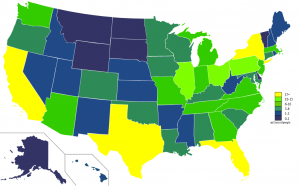By Scott W. Winchell
To think we are not an “entitlement nation” and that we have not been fleeced is to deny the obvious.
It is also completely disingenuous to deny that under the Obama Administration, and perhaps a major reason he has won two terms, “goodies” are a major driving factor in every facet of our society and that does not even include the fraud that is ObamaCare. James Madison must be rolling in his grave, as likely many other founding fathers are also doing.
When reading the article below concerning the number of means-tested recipients receiving government benefits compared to full-time, year-round workers, remember that the reported numbers released last week by the US Census Bureau were for the United States for the fourth quarter of 2011.
Also consider that in July of 2011, the total population of the United States (Without DC, Puerto Rico, and other territories) was approximately 313,281,717.
With these numbers in mind, comparing the 108,592,500 recipients not only outnumbers the total population of the Philippines and approaches that of Mexico as is mentioned in the article, they also outnumber the entire population of the 35 smallest states here in the USA at 106,407,993. (Again, not including DC, Puerto Rico, and all other territories)
Comparing these numbers in reverse to the most populated states of California, Texas, New York, and Florida at approximately 102,988,462 (July 2011), the recipients still need the total population of Minnesota as well to be close to equal.
These comparisons however do not include data from the years after the last quarter of 2011; almost two full years in which we saw massive growth in the percentage of the total population that pays zero income taxes (now @43%) and over 47 million collect food stamps.
Then we need to add in the numbers of those receiving “earned income tax credits” and non-means-tested aid. Remember also, the IRS paid out $110 billion in improper tax credits in the past five years and admitted it has no intention or way of fixing the problem.
Now we need to address the political ramifications of our present dilemma and who is doing what about it. We do not need to examine the Democratic Party cloely, we only need to use the term “more”. More taxes, more handouts, and now redistribution of health care. As for the Republicans, Andy C. McCarthy has written recently that “the establishment GOP has accepted progressivism’s central premise…embracing the welfare state.” McCarthy explains:
…asserting in last weekend’s column that what we commonly call the Republican establishment — i.e., not all individual Republicans but GOP leadership — “is more sympathetic to Obama’s case for the welfare state than to the Tea Party’s case for limited government and individual liberty.” The statement may have been provocative in the sense of expressing a truth that people on the political Right prefer not to talk about. But it was not controversial because it is indisputably true.
In his latest article cited above, he thanks Charles Krauthammer for helping prove his, and SUA’s shared point, true conservatives are not opposed to helping those who truly need help or that we do need some government, but we are opposed to the massive growth of the “nanny state” we now live in. McCarthy explains further:
Conservatives, including most of those who were against the New Deal, are not opposed to social welfare for the truly needy. We believe, however, in the constitutional framework, which reserves the promotion of social welfare to the states and the people. Social-welfare policy is not one of what Madison described as “the few and defined” powers delegated to the central government.
It is, instead, a paradigmatic power of the sovereign states because, as Madison elaborated, it “concern[s] the lives, liberties, and properties of the people, and the internal order, improvement, and prosperity of the State.” The Constitution thus enables Congress to tax and spend for the general welfare — on public goods, related to Congress’s carefully enumerated Article I powers, that benefit all Americans; not on redistributionist schemes that fleece some citizens for the benefit of others.
America, you have been fleeced, please read on:
Census Bureau: Means-Tested Gov’t Benefit Recipients Outnumber Full-Time Year-Round Workers
(CNSNews.com) – Americans who were recipients of means-tested government benefits in 2011 outnumbered year-round full-time workers, according to data released this month by the Census Bureau.
They also out-numbered the total population of the Philippines.
There were 108,592,000 people in the United States in the fourth quarter of 2011 who were recipients of one or more means-tested government benefit programs, the Census Bureau said in data released this week. Meanwhile, according to the Census Bureau, there were 101,716,000 people who worked full-time year round in 2011. That included both private-sector and government workers.
 That means there were about 1.07 people getting some form of means-tested government benefit for every 1 person working full-time year round.
That means there were about 1.07 people getting some form of means-tested government benefit for every 1 person working full-time year round.
The Census Bureau counted as recipients of means-tested government programs “anyone residing in a household in which one or more people received benefits from the program.” Many of these people lived in households receiving more than one form of means-tested benefit at the same time.
Among the 108,592,000 people who fit the Census Bureau’s description of a means-tested benefit recipient in the fourth quarter of 2011 were 82,457,000 people in households receiving Medicaid, 49,073,000 beneficiaries of food stamps, 20,223,000 on Supplemental Security Income, 23,228,000 in the Women, Infants and Children program, 13,433,000 in public or subsidized rental housing, and 5,854,000 in the Temporary Assistance for Needy Families program. Also among the 108,592,000 means-tested benefit recipients counted by the Census Bureau were people getting free or reduced-price lunch or breakfast, state-administered supplemental security income and means-tested veterans pensions.
The 108,592,000 people who were recipients of means-tested government programs in the fourth quarter of 2011 does not include people who received benefits from non-means-tested government programs but not from means-tested ones. That would include, for example, people who received Social Security, Medicare, unemployment, or non-means-tested veterans compensation, but did not receive benefits from a means-tested program such as food stamps or public housing.
In the fourth quarter of 2011, according to the Census Bureau, there were 49,901,000 people who received Social Security benefits, 46,440,000 who received Medicare benefits, 5,098,000 on unemployment, and 3,178,000 who received non-means-tested veterans compensation.
When the people who received non-means-tested government benefits from programs such as Social Security, Medicare, unemployment and non-means-tested veterans compensation are added to those who received means-tested government programs such as food stamps, Supplemental Security Income and public housing, the total number of people receiving government benefits from one or more programs in the United States in 2011 climbs to 151,014,000, according to the Census Bureau.
The 108,592,000 people who were beneficiaries of means-tested government programs in the United States in 2011 not only outnumbered full-time year-round workers, they also outnumbered the total population of the Philippines, which is 105,720,644, according to the CIA World Factbook. They are also approaching the number of people living in Mexico, which is 116,220,947, according to the CIA.


